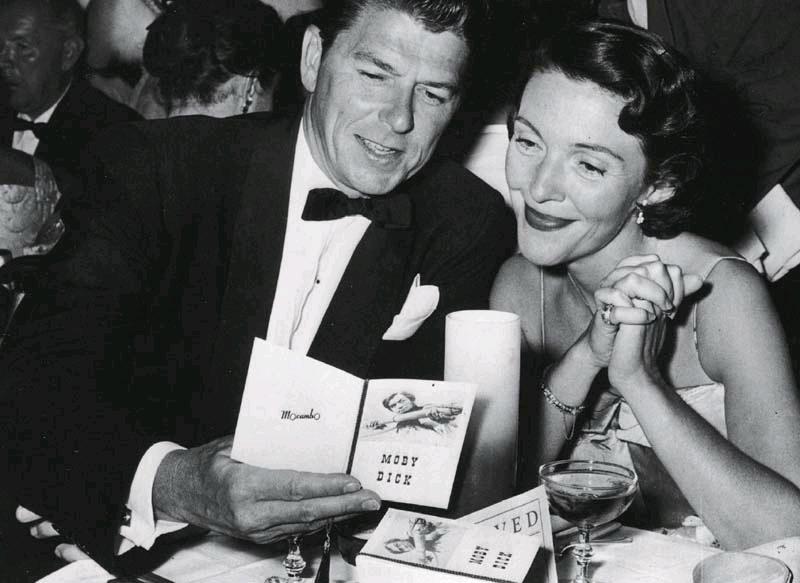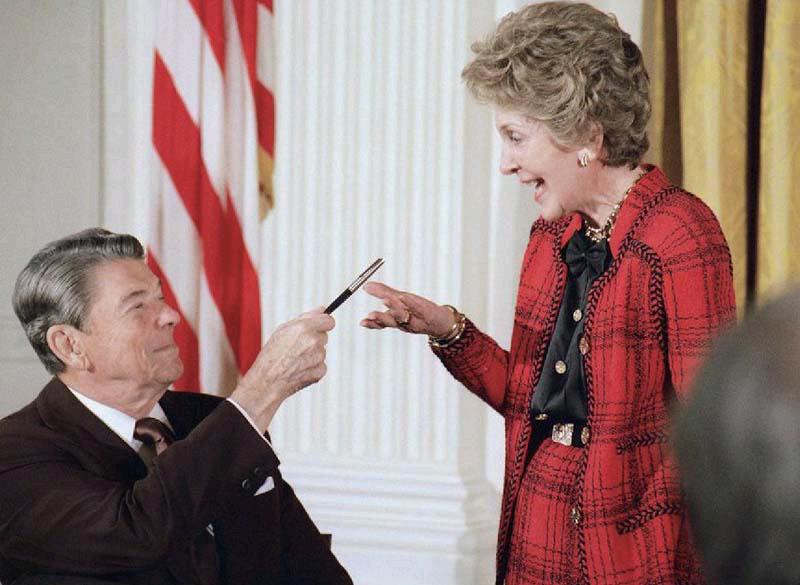纪念南希·里根:一段白宫之恋的落幕
2016-05-10NancyGibbs王炤翔
Nancy+Gibbs+王炤翔



2016年3月6日,94岁的南希·里根因病去世。这是一个生命的陨落,也是一段爱情童话的终结。在与里根总统相伴的半个世纪的岁月中,他们彼此依恋,相互扶持,在白宫上演了一场传奇般的爱恋。作为第一夫人,她敢言敢为,在公益事业方面颇有成就,但也曾招致一些争议。南希·里根将如何被历史铭记?也许这并不重要。正如曾任美国国会图书馆馆长的丹尼尔·布尔斯廷所说:“我们从未有过像你们两位一样的总统夫妇,单单这一点就是一个重要的史实。”
“My life didnt really begin until I met Ronnie,” Nancy Reagan wrote in her memoirs. She was the Wife, the one with the Gaze1), so devoted, so protective, that her own life and works, her needs and dreams, could be folded and fit into a tiny beaded handbag and tucked away as she focused every therm2) of energy on the American epic that was Ronald Reagan.
“Nancy came along,” Reagan once said, “and saved my soul.” Those who loved him should thank her, for never was a public man so faithfully served by a very private woman who read his needs, enabled his strengths, defused his weaknesses, and in the process displayed a love of country that refracted3) through her love of the man. Skeptical where he was trusting, meticulous4) where he was dreamy, equally stubborn but much more ruthless, she was able to grow in her role in a way that defied her many critics, and showed in twilight a grace and fortitude that cast her earlier course in a gentler light.
When she died on March 6 at the age of 94, it marked the end of a life and a love story the likes of which the modern White House had never seen.
Anne Frances Robbins Davis Reagan was born in New York City in 1921 to a car salesman and an actress and spent her first six years with little idea of what a normal family would feel like. Her father abandoned them when she was a baby; her mother Edith went back to work with a traveling theater company. She sent “Nancy” to live with an aunt and uncle in Maryland and for the next few years acted the role of mother from a distance.
But that all changed when Nancy was 8: Edith married a prominent neurosurgeon named Loyal Davis, who would eventually adopt Nancy as his own—though she always called him Dr. Loyal. The family moved to Chicago; suddenly hers was a life of field hockey and summer camp, nice clothes and high expectations. She majored in English and drama at Smith, worked for a while as a sales clerk at Marshall Fields5) and a nurses aid before following her mothers lead. A big break6) on Broadway opposite Yul Brynner7) got her an MGM8) screen test and a contract, and she was off to Hollywood in 1948.
Nancy Davis was not steamy or sultry9) enough to play the siren10), though she did date Clark Gable11) briefly. She was typically cast as the loyal wife, in movies like The Next Voice You Hear. Her “childhood ambition,” she wrote on her MGM biographical questionnaire in 1949, was “to be an actress.” But her “greatest ambition” was “to have a successful, happy marriage.” That year she met Ronald Reagan, president of the Screen Actors guild, who was still recovering from his split with actress Jane Wyman; one newspaper account called it “a romance of a couple who have no vices12),” with Nancy knitting Ronnie argyle13) socks.
“I dont know if it was exactly love at first sight,” Nancy said, “but it was pretty close.” The two were married in March of 1952 in a secret ceremony at the Little Brown Church near Los Angeles; their daughter Patti was born that October and son Ron in 1958. Nancy would also be stepmother to Reagans children from his previous marriage, son Michael and daughter Maureen. She retired from movies in 1962 to be a full-time homemaker.
It took the jaded14) natives of Hollywood and Sacramento15) and Washington some time to get used to a marriage so sentimental. They would always hold hands; he called her “Nancy Pants” and “mommy.” There would be notes scattered around the White House, especially on special occasions. “Whatever I treasure and enjoy,” Ronnie wrote, “this home, our ranch, the sight of the sea—all would be without meaning if I didnt have you. I live in a permanent Christmas because God gave me you.” Every marriage finds its own balance, she used to say. He was relentlessly upbeat16): she did the worrying for both of them. She was obsessive about details where he seemed cavalier17); he was all-forgiving, while she could hold a grudge. But they were equally solicitous18) and protective of each other. She recalls a dinner with presidential historians, where Librarian of Congress Daniel Boorstin observed that “We have never had a presidential couple like the two of you, and that alone is an important historical fact. The love and devotion you show each other isnt seen much around here these days.”
It is hard for anyone married to a public figure to bear the attacks aimed at the person they love. But Nancy Reagan had an even harder challenge: Her husband was so popular that attacks just skidded off his shiny image; but she was a different story, inscrutable19) where he seemed so transparent, cool and cautious where he was all warmth and tall tales and high hopes. It started from her first days as First Lady of California, after he won his race for governor in 1966. She discovered that the 1877 mansion was officially a “firetrap,” as the local authorities put it. She said it was concern for her familys safety that inspired their move into a fancy suburb; her critics called it snobbery, the hostility only partly allayed in the years that followed by her efforts to help returning Vietnam vets and promote the Foster Grandparents program20).
Whatever scrutiny and skepticism she endured in California, however, was nothing compared to what was waiting for her in Washington, when she arrived in 1981 to begin what shed come to describe as “the most difficult years of my life.”
“The first year was a terrible year,” she said, made worse by the loss of her stepfather, a cancer scare and most crushing, the assassination21) attempt that left four men shot, Reagan and spokesman James Brady badly wounded. Years later, she said, she still woke up at night remembering the scene at the hospital; the blood and bandages and tubes, a blue pinstripe suit shredded, a husband pale and grey, and closer to dead than anyone knew at the time.
She had always been highly protective; but after the shooting, her monitoring of her husbands activities had a more desperate urgency, to the point, famously, of consulting an astrologer22) about when it was too dangerous for him to be making public appearances. “I cringe every time we step out of a car or leave a building,” she said, and she began running the Presidents schedule by her, a small balm23) on the general sense of helplessness she felt when it came to his safety.
She also protected him from threats closer at hand, particularly aides whom she suspected were more focused on their own agendas than his presidency. In his book about her years later, Michael Deaver24) said that if the President had a single great failing, it was that he had no good sixth sense about people, or an ability to see their darker side; the reluctance to discipline extended even to his children. “Nancy had to fill that role as well,” Deaver argued.
Reagans political gift involved being able to see the big picture and sell it, Nancys expertise was more intimate, analytic, with a shrewd sense of how an organism like the White House staff worked. She had studied both Nixon and Kissingers memoirs before arriving in Washington, and she was alert to its ways. “I think Im aware of people who are trying to take advantage of my husband—who are trying to end-run him lots of times—who are trying to use him—Im very aware of that,” she told reporter Chris Wallace in 1985. More aware, she added, than Reagan himself. “I try to stop them.”
Her most famous moment as First Lady came almost by accident: the Just Say No campaign against drug use at a time when abuse was running out of control. “I was in California and I was talking to, I think, fifth graders, and one little girl raised her hand and said, ‘Mrs. Reagan, what do you do if somebody offers you drugs? And I said, ‘Well, you just say no. And there it was born. I think people thought that we had an advertising agency over who dreamed that up—not true.” Reagan called her “my secret weapon” in his fight against drug use. She hosted a 1985 White House conference on drug abuse, featuring wives of world leaders, and three years later became the first First Lady to address the U.N. General Assembly, speaking on drug-trafficking laws. Many aspects of the war on drugs may have been ill-conceived25) or entangled in politics; but the effort to change attitudes among kids was one aspect that showed results. A study in 1988 found that only 39% of high school seniors reported using illegal drugs in the last year, down from 53% when Reagan took office.
In 1994, when President Reagan revealed in a letter to the American people that he was afflicted with Alzheimers, he observed that “I only wish there was some way I could spare Nancy from this painful experience.” Thus began what Nancy would come to call the “long goodbye,” a decade spent tending to the husband who in time could not recognize her any more. Anyone who imagined her post-White House would be one of glamour and travel and parties saw instead a kind of cocooning26), as she stayed close to home, seldom entertaining, excusing herself even from luncheons to go and call and check on him.
In May 2004, a month before her husband died, Nancy appeared at a fundraiser for stem-cell research. “Ronnies long journey has finally taken him to a distant place where I can no longer reach him,” she said. “Because of this, Im determined to do whatever I can to save other families from this pain.” A month later, she was the tiny, pale figure bent over the dark casket27) as America mourned one of its giant Presidents. She had worked over every detail of the 300-page blueprint for the commemorations.
Sometimes, she told ABCs Dianne Sawyer a year later, she still talked to him, wandering around a house filled with pictures of him. “Hes very much with me,” Nancy said. “Everything still is all about him.”
“遇见罗尼后,我的人生才真正开始。”南希·里根在她的回忆录中写道。她曾是美国的第一夫人,总是深情地注视着丈夫,对他全心全意,倍加呵护;而她自己的生活和事业,需求和梦想,都可以折起来放进一个小小的串珠手提包中,藏到一边,因为她把所有的精力都放在了罗纳德·里根这位美国史诗般的人物身上。
里根曾说:“南希的出现拯救了我的灵魂。”爱他的人都应该感谢南希,因为从未有哪位公众人物能受到妻子如此尽心的照顾。她懂得丈夫的需求,帮助他发挥优势,缓和他的劣势,并在这一过程中透过对丈夫的爱彰显出对国家的爱。她在丈夫轻信时保持怀疑,在他飘飘然时保持谨慎,和他一样固执,但远比他果断。她无惧众多的批评者,得以在自己扮演的角色中不断成长,并在晚年显示出一种优雅和坚韧,为她早期的人生轨迹笼上一片更为柔和的光彩。
南希于3月6日去世,享年94岁。这标志着一个生命的结束,也标志着现代白宫从未有过的一段爱情故事就此落幕。
安妮·弗朗西丝·罗宾斯·戴维斯·里根于1921年出生在纽约市,父亲是汽车销售员,母亲是一名演员。她在六岁前几乎没有体验过正常家庭的生活。她尚在襁褓中时,父亲就抛弃了她们母女;母亲伊迪斯重返舞台,在一个流动剧团工作。她把“南希”送去马里兰州,和姨父姨母一同生活。之后的几年里,她仍履行着母亲的职责,但却不在孩子身边。
但是,在南希八岁时,一切都有了好转。伊迪斯嫁给了一位杰出的神经外科医生,名叫洛亚尔·戴维斯。他最终抚养了南希,视如己出,尽管她一直都叫他洛亚尔医生。他们一家人搬去了芝加哥。南希的生活中突然出现了曲棍球、夏令营和漂亮的衣服,她身上还承载着父母很高的期望。她在史密斯学院主修英文和戏剧,在马歇尔·菲尔德百货公司做过一段时间的售货员,还做过助理护士,后来跟随母亲当上了演员。她和尤尔·伯连纳在百老汇联袂出演,由此时来运转,获得了在米高梅试镜的机会,并与之签约。1948年,她去了好莱坞。
南希·戴维斯不够性感妖娆,演不了勾人的角色,虽然她确实曾和克拉克·盖博有过短暂的恋情。她常常扮演忠诚的妻子,出演了《你听到的下一个声音》等影片。1949年,她在米高梅的个人情况问卷中写道,她“童年的志向”是“成为一名演员”,但她“最大的志向”是“拥有幸福美满的婚姻”。那一年,她遇见了罗纳德·里根,美国影视演员协会的主席。当时里根还没有从他与演员简·惠曼的离婚中恢复过来。报纸上的一则报道称两人的结合是“一对完美恋人的爱情故事”,南希还给里根织过菱形图案的短袜。
“我不知道这到底算不算一见钟情,”南希说,“但应该差不多。”1952年3月,两人在洛杉矶附近的“棕色小教堂”举行了秘密婚礼。他们的女儿帕蒂于同年10月出生,儿子罗恩于1958年出生。里根和前妻育有儿子迈克尔和女儿莫琳,南希也成为他们的继母。1962年,她退出了电影圈,成为全职家庭主妇。

他们的婚姻如此浓情蜜意,这让好莱坞、萨克拉门托和华盛顿麻木的市民们花了一段时间才适应。他们总是手牵着手。里根称呼妻子为“裤子南希”和“妈咪”。白宫里四处都是便条,尤其是在特别的日子。“无论我珍视和喜爱什么,”里根写道,“这个家,我们的牧场,大海的景色——如果没有你,这一切都会失去意义。我每天都在过圣诞节,因为上帝把你赠与了我。”南希过去常说,所有的婚姻都会找到自己的平衡点。里根总是无限乐观,而她为他们两人焦心劳思;在他看上去漫不经心时,她会注重细枝末节;他总是不计前嫌,而她则会耿耿于怀。但是他们对彼此的挂念和护佑是一样的。南希记得有一次和研究总统的历史学家们共进晚餐,国会图书馆馆长丹尼尔·布尔斯廷说道:“我们从未有过像你们两位一样的总统夫妇,单单这一点就是一个重要的史实。你们对彼此的爱与忠诚如今在这里已不多见了。”
任何与公众人物结婚的人都难以承受爱人遭到的攻击,而南希·里根所面临的挑战则更为严峻。她的丈夫太受欢迎,针对他的攻击无损于他耀眼的形象,但是她不一样。他显得胸无城府时,她却让人难以捉摸;他热情洋溢唱高调时,她却冷静谨慎。这种情形从1966年里根当选加州州长、她成为加州第一夫人最初的日子就开始了。她发现,那栋1877年修建的州长宅邸被当地政府称作是一栋“容易失火的建筑”。她说正是出于对家人安全的考虑,他们才搬到了漂亮的郊区住宅。批评她的人说她势利,在后来的岁月中,尽管她努力帮助回国的越战老兵,并推动祖父母收养儿童计划,这种敌意也没有收敛多少。
然而,不管南希在加州受到怎样的审视和怀疑,这与她之后在华盛顿的遭遇相比根本算不了什么。1981年她来到华盛顿,开始了她后来所称的“一生中最艰难的日子”。
“第一年非常糟糕。”她说。雪上加霜的是她的继父去世,她自己又疑似患上癌症,而最沉重的打击是里根遇刺——四人遭到枪击,其中里根和白宫新闻发言人詹姆斯·布雷迪伤势严重。她说,许多年后,她仍会在夜里惊醒,想起那时在医院的场景:鲜血、绷带、管子、扯烂的蓝色细条纹西装、面如死灰的丈夫。那时谁也不知道他离死亡有多近。
南希本就一直对丈夫呵护有加,而在遇刺事件之后,她更加不顾一切地迫切监控丈夫的活动。众所周知,她甚至到了咨询占星师的地步,以了解何时对里根来说过于危险,不适合公开亮相。她说:“每次我们下车或者从一栋建筑里出来,我都会感到不安。”她开始过问里根的日程,这能稍稍慰藉她在丈夫的安全问题上常有的无助感。
她也会保护丈夫免受身边人的威胁,尤其提防那些她怀疑对总统的事情不上心,反而更惦记他们自己的事情的助理们。多年后,迈克尔·迪弗在一本关于南希的书中写道,如果要说里根总统有一个大的缺点,那就是他对于人没有很好的第六感,或者说看不到人的阴暗面;他不喜管束别人,甚至对自己的孩子也是如此。“南希也不得不充当这方面的角色。”迪弗说。
里根的政治天赋在于他能够看到全局,并能让别人接受;南希的专长在于她更加平易近人,善于分析,能敏锐地洞察像白宫班子这样的有机组织是怎样运作的。她到华盛顿之前研究过尼克松和基辛格的回忆录,对于其中的门道有所警觉。1985年她曾对记者克里斯·华莱士说:“我想我知道哪些人试图算计我丈夫,哪些人总是试图对他拐弯抹角,哪些人试图利用他,这些我都了然于心。”她还补充道,她比里根自己还清楚,“我会尽力阻止他们”。
南希作为第一夫人最著名的事迹几乎是偶然发生的——在毒品滥用几近失控之际出现的“向毒品说不”的毒品抵制运动。“当时我在加州,好像是在和五年级的孩子们讲话。一个小女孩举起手说:‘里根夫人,如果有人给你毒品,你会怎么做?我说:‘嗯,那你就说不。这句话就是这么来的。我想人们会以为我们请了一个广告公司,让他们凭空想出了这个口号,但事实并不是这样。”里根把南希称为他打击毒品的“秘密武器”。1985年,她主持了一场关于滥用毒品的白宫会议,有世界各国领导人的妻子出席。三年后,她成为第一位在联合国大会上发言的第一夫人,发言主题为毒品走私的法律。打击毒品的行动在许多方面也许都计划不周,或是掺杂了政治斗争,但是改变孩子对毒品的态度这方面的努力还是取得了成效:1988年的一项研究发现,此前一年只有39%的高中毕业班学生使用非法毒品,比起里根刚上台时的53%有所下降。
1994年,里根总统在写给美国人民的一封信中披露,他患上了阿尔茨海默症。他说:“我只希望能有办法让南希不要受此病之苦。”自此,南希开始了她之后所说的“漫长的告别”,用了十年来照顾后来连她也不再认得的丈夫。人们原本想象她离开白宫后的生活会多姿多彩,四处旅行,派对不断。但他们看到的却是一种深居简出的生活,她从不出远门,很少在家待客,甚至会在午宴中途礼貌地离席,打电话回家查看丈夫的情况。
2004年5月,在丈夫去世前一个月,南希出席了一场为干细胞研究筹款的活动。“罗尼病后的漫漫长路最终把他带到了一个我再也够不到他的遥远的地方,”她说,“因此,我决心尽最大努力,让其他家庭不必受此痛苦。”一个月后,美国举国上下悼念这位伟大的总统,她弯腰站在漆黑的棺材前,身形瘦小,面色苍白。相关纪念活动的方案长达300页,每一个细节她都仔细检查过。
一年后,她告诉美国广播公司的黛安娜·索耶,有时她仍然会跟丈夫聊天,在一栋到处都是他的照片的房子里四处走动。“他就在我身边,”南希说,“他仍然是我的一切。”
